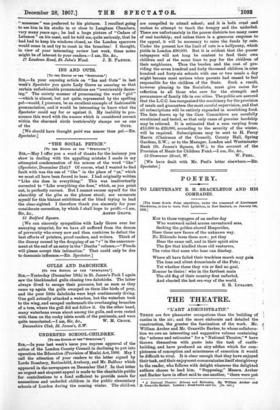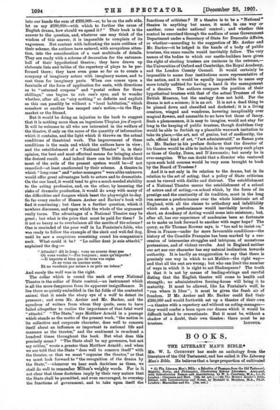THE THEATRE.
"L'ART ADMINISTRATIF."
THERE are few pleasanter occupations than the building of castles in the air; and the more elaborate and detailed the construction, the ,greater the fascination of the work. Mr. William Archer and Mr. Granville Barker, to whose collabora- tion we owe an interesting and suggestive volume containing the " scheme and estimates" for a "National Theatre,"* have thrown themselves with gusto into the task of castle- building, and have produced an airy edifice which for com- pleteness of conception and minuteness of execution it would be difficult to rival. It is clear enough that they have enjoyed their task, and their enjoyment communicates itself straightway to the reader, who follows with delight wherever the delighted authors choose to lead him. " Supposing," Messrs. Archer and Barker have in effect said to one another, "there were put • A National Theatre : Scheme and Estimates. By William Archer and H. Granville Barker. London : Duekworth and Co. [5s. net.]
into our hands the sum of £330,000—or, to be on the safe side, let us say £380,000—with which to further the cause of English drama, how should we spend it ? " Their book is the answer to the question, and, whatever one may think of the wisdom of this answer, it is impossible to complain of its vagueness. Not content with indicating the main outlines of their scheme, the authors have entered, with scrupulous atten- tion, into the consideration of a vast multitude of details. They are ready with a scheme of decoration for the entrance- hall of their hypothetical theatre ; they have drawn up elaborate lists and tables of. the repertory of plays to be per- formed there ; they have even gone so far as to create a company of imaginary actors with imaginary names, and to cast them for imaginary parts. When one comes upon a facsimile of the form of application for seats, with directions as to " returned coupons " and "postal orders for three shillings," one begins to rub one's eyes, and to wonder whether, after all, an "airy nothing" so definite and explicit as this can possibly be without a "local habitation," which somehow or another has escaped one's notice,—in the Hay- market or the Strand.
But it would be doing an injustice to the book to suggest that it is nothing more than an ingenious Utopian jeu d'esprit. It will be welcome to all who are interested in the welfare of the theatre, if only on the score of the quantity of information which it contains, and the light which it throws on the actual conditions of theatrical work. The improvement of these conditions is the main end which the authors have in view; and the establishment of a "National Theatre" is, in their opinion, the best and most effectual means for bringing about the desired result. And indeed there can be little doubt that most of the evils of the present system would be—if not remedied—at least ameliorated by their scheme. A theatre in which " long runs " and " actor-managers " were alike unknown would offer great advantages both to actors and to dramatists.
On the one hand, it would tend to give a much-needed stability to the acting profession, and, on the other, by lessening the risks of dramatic production, it would do away with many of the difficulties and dangers which beset the playwright to-day. So far every reader of Messrs. Archer and Barker's book will find it convincing ; but there is a further question, which it nowhere discusses, and upon which the whole of the argument really turns. The advantages of a National Theatre may be great ; but what is the price that must be paid for them ? Is it not so heavy as to overbalance all the merits of the scheme ? One is reminded of the poor wolf in La Fontaine's fable, who was ready to follow the example of the sleek and well-fed dog, until be saw a suspicious something round his companion's neck. What could it be ? "Le collier dont je suis attache," explained the dog :— " Attaché ? dit le loup ; vous ne courez done pas
Ou vous voulez ?—Pas toujours ; mais qu'importe —It importe si bien que de tons vos repas Jo ne veux en aucune sorte, Et ne voudrais pas meme a ce prix un tresor."
And surely the wolf was in the right.
The collar which is round the neck of every National Theatre is the collar of State control,—an instrument which is all the more dangerous from its apparent insignificance. It lies there so quietly embedded in the fat folds of the contented animal that it needs the sharp eye of a wolf to detect its presence ; and even Mr. Archer and Mr. Barker, and the squadron of writers from whom they quote, seem to have failed altogether to realise the importance of that fatal word " attache." " The State," says Matthew Arnold in a passage which stands as the motto of the present work, " the nation in its collective and corporate character, does well to concern itself about an influence so important to national life and manners as the theatre," and the sentiment is re-echoed a hundred times throughout the book. But what does this precisely mean ? " The State shall be my governors, but not my critics," wrote a greater than Matthew Arnold ; and when we are told that the State " does well to concern itself " with the theatre, or that we must " organise the theatre," or that we must look forward to "the recognition of the drama by
the State,"—whenever we hear such doctrines as these, we shall do well to remember Milton's weighty words. For is it not clear that these doctrines imply by their very nature that the State shall be permitted, and even encouraged, to overstep the functions of government, and to take upon itself the functions of criticism P If a theatre is to be a "National." theatre in anything but name, it must, in one way or another, come under national control ; and whether this control be exercised through the medium of some Government Department under a Secretary of State for Dramatic Affairs, or whether—according to the suggestion of Mr. Archer and Mr. Barker—it be lodged in the hands of a body of public trustees, the same results would inevitably follow. The very names of the bodies to which our castle-builders have given the right of electing trustees are ominous in the extreme,— the Universities of Oxford and Cambridge, the Royal Academy, and the London County Council. It would certainly be impossible to name four institutions more representative of the nation, and it would be equally impossible to name any more totally unfitted for having a hand in the management of a theatre. The authors compare the position of their hypothetical trustees with that of the actual Trustees of the British Museum, but the analogy does not hold. For the drama is not a science; it is an art. It is not a dead thing to be pinned down and classified and docketed; it is a living creature, winged and wondrous, hovering inexplicably over magical flowers, and amenable to no laws but those of fancy. Such a phenomenon, it is easy to imagine, would not stay for long in the keeping of public trustees, though doubtless they would be able to furbish up a plausible waxwork imitation to take its place,—the art, not of genius, but of mediocrity, the safe, official kind of art, "Fart administratif," as Renan puts it. Mr. Barker in his preface declares that the director of his theatre would be able to include in its repertory such plays as those of Gorky, Ibsen, and D'Annunzio; but surely he is over-sanguine. Who can doubt that a director who ventured upon such bold courses would be very soon brought to book by the Board of Trustees ?
And it is not only in its relation to the drama, but in its relation to the art of acting, that a policy of State criticism must be viewed with dislike and distrust. The establishment of a National Theatre means the establishment of a school of actors and of acting,—a school which, by the force of its prestige and the continuity of its tradition, must in the long run assume a predominance over the whole histrionic art of England, with all the claims to orthodoxy and infallibility which such a predominance would inevitably involve. In short, an Academy of Acting would come into existence ; but, after all, has our experience of academies been so fortunate as to make us look forward to another with eager hope ? The query, as Sir Thomas Browne says, is " too sad to insist on." Even in France—under far more favourable conditions—the history of the Comedie Francaise has been marked by a suc- cession of internecine struggles and intrigues, of monstrous pretensions, and of violent revolts. And in England neither our art nor our character has any natural inclination towards authority. It is hardly an exaggeration to say that there is precisely one way in which to act Moliere—the right way— and that all the rest are wrong; but who can limit the number of ways in which it is right to act Shakespeare ? The truth is that it is not by means of leading-strings and careful dieting that the English theatre will come to health and strength; no administrative forcing-house will bring it to maturity. It must be allowed, like La Fontaine's wolf, to "run where it likes"; it must be given the fresh air of freedom. If Mr. Archer and Mr. Barker could find their £380,000 and would forthwith set up a theatre of their own —a theatre with a repertory and without an acting-manager- they would confer a boon upon our drama which it would be difficult indeed to overestimate. But it must be, without a shadow of a doubt, their own theatre: there must be no



































 Previous page
Previous page